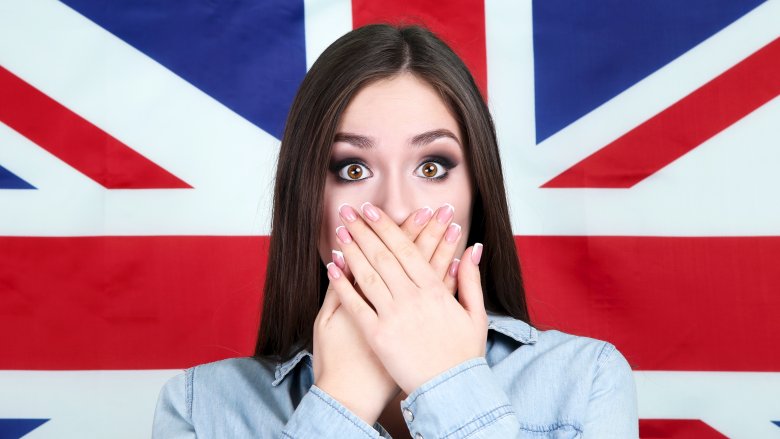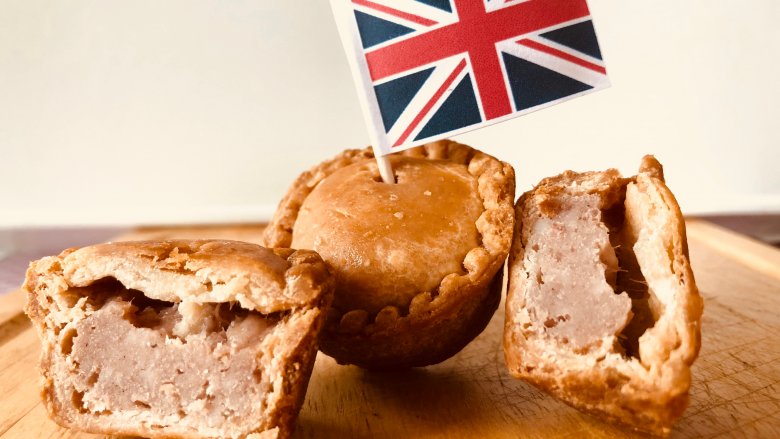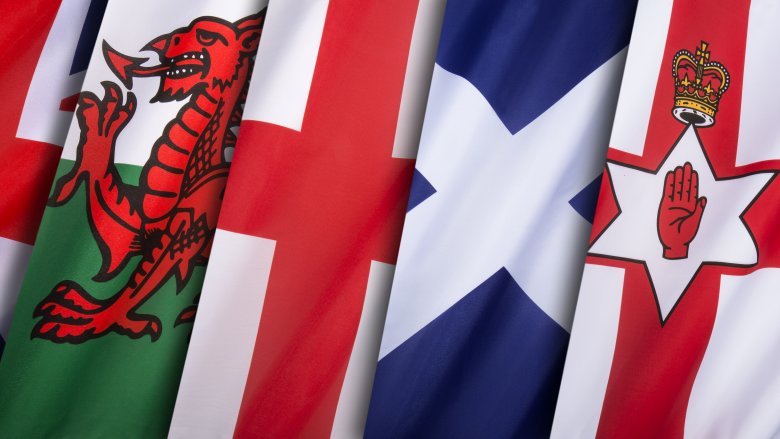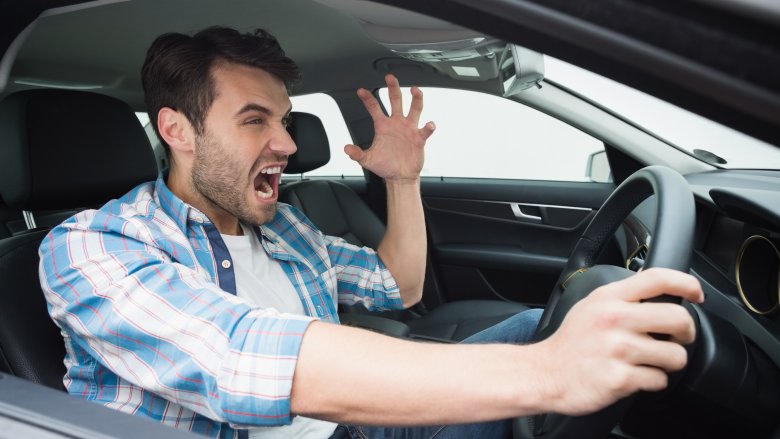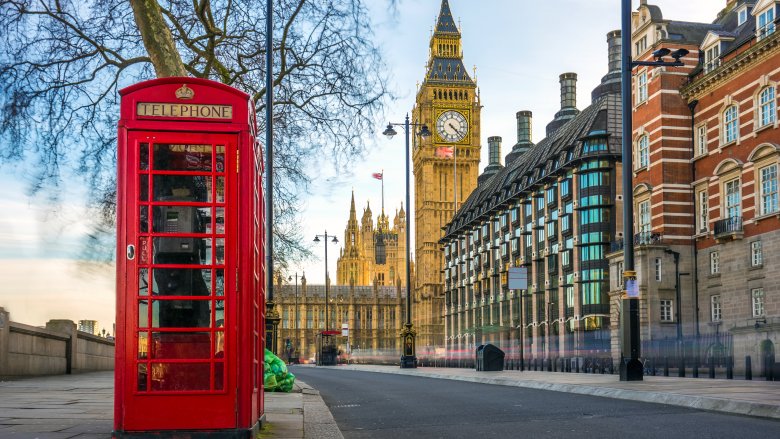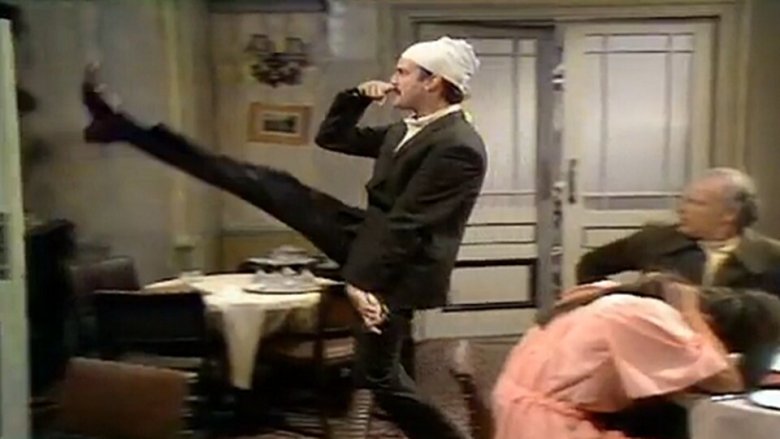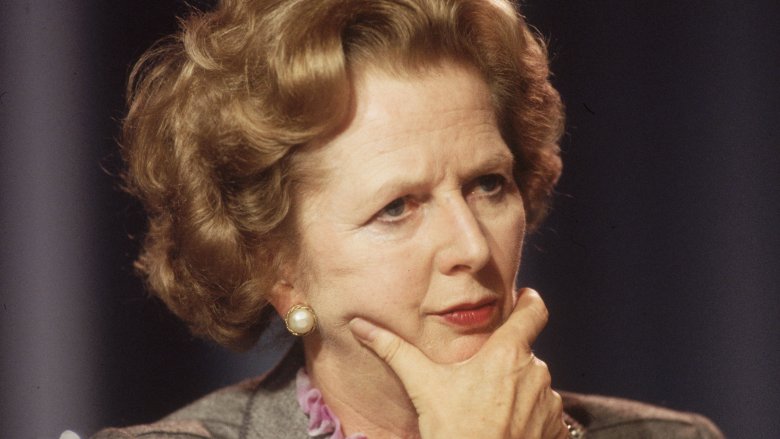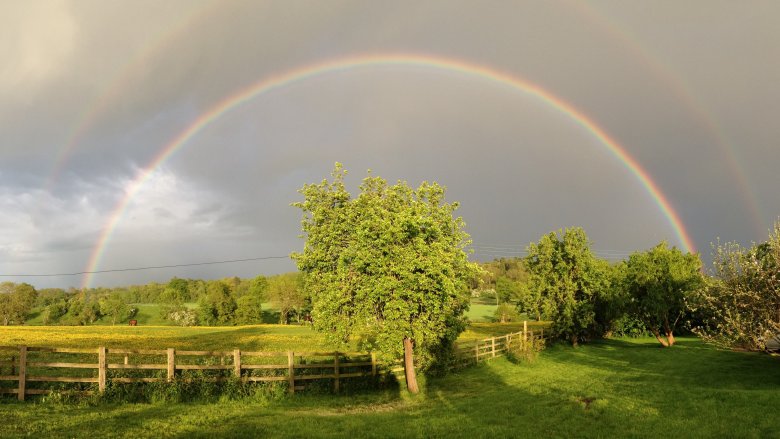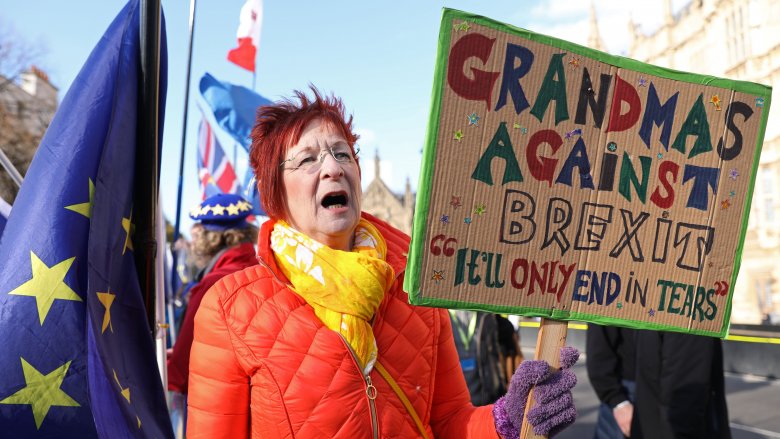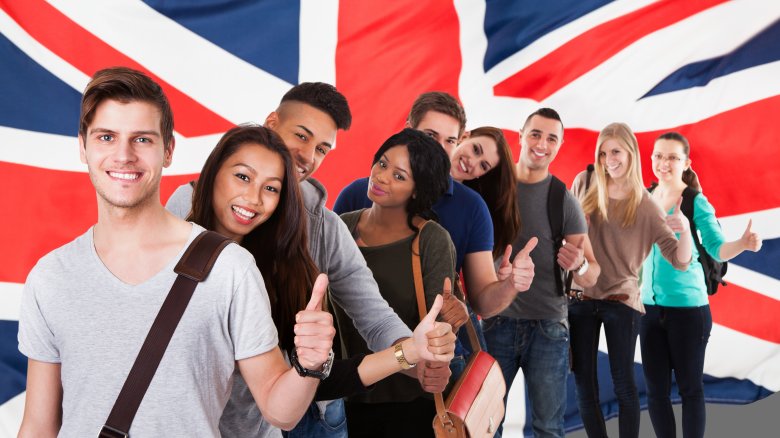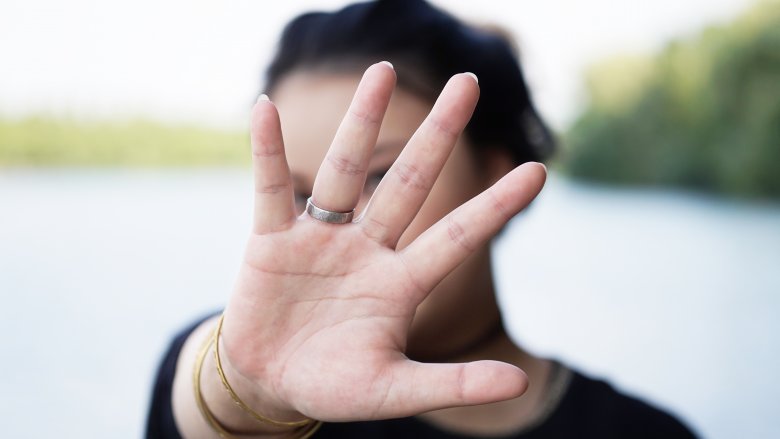12 Things You Should Never Do In Britain
Given that you're here, reading this on an English-language website, you're probably aware of a little place called Great Britain. The one-time epicenter of the largest empire the world has ever seen, Britain has had a disproportionate effect on the rest of the planet. Maybe you're from the U.S. and you alternate thanking the Brits for your language and hating them for that whole "trying to crush your independence" thing. Maybe you're Canadian and you're slightly amazed you still have the Queen as your head of state. Maybe you're French and you're just here to hate-read about those jerks across the Channel. Basically, whoever you are, you probably think you have a pretty good idea of what Britain is all about.
Well, prepare to have some of your cherished assumptions dashed against the rocks of reality. No matter how much you dig Monty Python, Downton Abbey, and Doctor Who, your foreign eyes are probably blind to the weirdly complex social rules that govern every British interaction. Make any of these common mistakes while vacationing in Britain, and prepare to have the world's most well-spoken lynch mob after you.
Act like the food is as bad as its reputation
If you know anything about British food, you know that it's bad. Leathery roast beef, warm beer, joyless deserts, and the heart attack that is Scottish cuisine are all perils visitors to Britain have to navigate. At least, if they're planning to visit via time-traveling DeLorean. Modern British cuisine isn't just experiencing a revival — it revived so long ago that there are Brits in their thirties who are too young to have any idea why your food-based jokes are meant to be funny.
According to BBC America, the opinion you likely have of British food comes from the postwar years. Wartime rationing hit Britain hard. All the American images of the 1950s as a time of plenty simply didn't apply to Britain. Rationing didn't end until 1954 (via BBC), by which time culinary skills had taken a serious knock. But even in the years after rationing, getting a good meal in Britain was far from impossible. Thanks to the heritage of the empire, a swathe of Caribbean, African, and especially Indian restaurants started to appear from the 1960s onward (via the Guardian).
Today, getting a good meal in Britain is arguably easier than in America. The Telegraph lists 163 Michelin starred British restaurants, compared to 148 in the U.S. Hear that, America? That's the sound of every chef in Britain simultaneously doing a mic drop.
Accidentally call Great Britain England
Look, British geography is confusing. There are four different countries to remember, plus terms like "Great Britain" and "the United Kingdom," not to mention that whole thing with Northern Ireland. Is it any wonder many foreigners simply give up and use the name "England" to refer to the whole lot? Well, you better drop that habit now, unless you want to spend your vacation competing with Piers Morgan for the title of "most hated person in Britain."
Here's the deal (via Smithsonian). The official nation state is the U.K. The "United" part of "United Kingdom" refers to the four separate countries that make up the U.K.: England, Scotland, Wales, and Northern Ireland. Great Britain is the island that England, Scotland, and Wales call home, while Northern Ireland is part of the island of Ireland. The Welsh and Scots have their own super-distinct cultural identities, with the Welsh even having their own widely spoken language. And they all hate being referred to as English.
For the whole history of the U.K., England has been the senior partner. It's where the capital is, where the money is, and it has a population over ten times that of Scotland, the next biggest country. This has led to resentment about England dominating everything and generally acting like that awful friend who always has to be the center of attention. And nobody wants to be mistaken for that friend.
Assume the swearing rules are the same as in America
Britain and the U.S. share a common language, so it's logical to think they talk the same way. Sure, Brits might say "mate," "pavement" (for "sidewalk"), and "trousers," but these are just delightful quirks. Where the real serious stuff is concerned, like cussing up a storm, the default assumption is that things are identical.
Oh boy, are you ever in for a shock. While the literal meaning of the biggest swears are totally unchanged, the offense value associated with them is wildly different. Take the biggest swear of all, the Big C. In the U.S., it's not just vile, it's considered so misogynistic that saying it aloud is akin to just declaring "I hate women" (but even worse). In Britain, that misogynistic aspect just isn't there. As the Scottish journalist Ally Fogg has noted, the c-word is more related to class and regionalism in Britain, a way for those in the north to shock the sensitive souls in the south rather than attack women's bodies. In parts of Scotland, it's even used to affectionately refer to family members.
This cuts both ways, as Ars Technica notes. For example, "pissed" in the U.K. isn't a way of saying angry, but a somewhat vulgar term for being drunk.
Think the U.K. is London
You know London. The British capital is one of the most visited cities on Earth, according to Lonely Planet. It's the focus of most major British movies, the city everything revolves around in James Bond, Harry Potter, and nearly everything ever made starring Hugh Grant. So where do most tourists head straight to when they visit Britain? If you can't guess the answer, you may want to think about investing in some memory training apps. (Hint: It's London.)
But if you think visiting London means visiting Britain, prepare to discover just how wrong you are. A whole lot of the population of Britain have extremely negative opinions about the capital. A YouGov survey taken in 2018 found that over two thirds of all Brits think London's economic success has done nothing for their area. In Scotland, that figure nearly hit 80 percent. Londoners themselves were dismissed as arrogant and insular and, most telling of all, living in London described as an impossible dream by four out of five respondents.
If you don't live in Britain, it's hard to grasp just how much resentment some areas have for London. There's just no other city that steals the limelight so effectively. In the U.S., finance, entertainment, and government are (roughly) divided between New York, Los Angeles, and Washington D.C. Well, London is like mixing all those together, then throwing in Seattle, Austin, and Vegas for good measure. No wonder places like Manchester and Birmingham feel left out.
Don't mention the war!
Ahh, World War II. If you're American, you probably know the biggest war in human history as the second time that America saved Europe's collective behinds (with a little help from the USSR). But don't be tempted to assume that means there's any residual goodwill left over in Britain, or that you can use it as the basis for some good-natured ribbing. Where World War II is concerned, the best advice anyone coming from the USA can take is from John Cleese in Fawlty Towers: Don't mention the war!
That whole "America saved everyone's butts" interpretation of history you grew up with? People growing up in Britain got a different version, one where the plucky Brits stood alone against Hitler while the U.S. refused to get itself in gear. In this telling, America didn't so much get involved and save everyone as it did turn up late like usual, act brash, and then hog all the credit after the war ended. That goes double for World War I, which Britain lost something close to a million men winning, compared to around 116,000 for the U.S.
The subject is even more painful for Brits when you consider how few people agree with them. A 2015 YouGov survey found people all over Europe felt the US won World War II ... with the exception of the U.K. and Norway, who felt Britain was more responsible. Still, Brits are always forgetting the contribution places like India made to the own war effort, so maybe karma?
Express admiration for Margaret Thatcher
You're in a new country — what better way to connect with the locals than showing some knowledge of their history! That glib piece of travel advice is always a dangerous game, but it can be especially so if your historical knowledge only comes from a foreign perspective. Take one of Britain's most famous prime ministers. Margaret Thatcher is considered a hero in many parts of Eastern Europe for her anti-Communist stance. In the U.S., she's seen as the British Ronald Reagan. But travel to Britain and tell your new friends how much you admire Thatcher and be prepared for the argument of the century.
The Week summed it up best. Prior to Trump, there's simply never been a U.S. president who attracted such simultaneous love and visceral hatred. When Thatcher died in 2013, there were street parties in London and Scotland (via the Guardian), and a concerted effort to get the Wizard of Oz song "Ding Dong, the Witch Is Dead!" to the top of the U.K. music charts. It reached No. 2. Americans didn't do that even when Richard Nixon died.
It's not that everyone in Britain hates Thatcher. A 2019 YouGov poll named her the best prime minister since 1945. Plenty of ordinary Brits really do love her. But her legacy at home is way more complicated than it is abroad. Maybe play it safe and stick to discussing the weather.
Assume the weather is as terrible as Brits say it is
Fog-shrouded streets, rainswept moors, mists, marshes, overcast days ... there are plenty of reasons to go to Britain, and the weather is absolutely not one of them. The island nation is famous for its appalling climate. As far back as the first century, the Roman historian Tacitus wrote that British weather was "pretty foul, with frequent rain and fog," and the forecast has remained gloomy ever since. The U.K.'s main summer festival, Glastonbury, is infamous for getting waterlogged (via BBC). That's in summer! Imagine what it must be like in freakin' winter.
No lie, British weather really can be appalling. The key word there is "can." While pretty much any day in the year is fair game for rain, the opposite is also true. Rather than being bad, British weather is unpredictable, and that can just as easily mean temperatures in the mid-80s for months on end as it can clouds and rain and misery.
According to the BBC, British weather is so changeable because five different air masses meet over the island, bringing everything from snow in June to heatwaves in February. You can easily go from miserable, driving rain to baking heat in the space of just an hour or two. If you're going to Britain, don't just pack for rain. Pack for everything.
Invoke religion
Here's a fun way to quickly embarrass large groups of Brits. Just say "God bless you" or otherwise invoke religion, and watch in amusement as everyone suddenly gets really awkward. The British public basically doesn't do religion. A major survey in 2017 found over half of all Brits claimed to have no religion at all (via the Guardian). But it's not just the spread of atheists and agnostics that makes being outwardly religious a strange idea in the U.K. According to Christianity Today, even religious people in Britain feel acutely embarrassed about discussing faith in public.
This has had some impacts that will sound deeply weird to American ears. During Tony Blair's time as prime minister, Labour party spin doctor Alastair Campbell forced the deeply religious Blair to keep his beliefs to himself (via the Telegraph). Famously, this included once interrupting an interview to tell the prime minister "we don't do God." That's right, Americans! In Britain, expressing your devotion to God can actually lose you votes.
This all gets even weirder when you remember Britain has no legal separation of church and state. The British Parliament's upper chamber reserves 26 seats for bishops from the Church of England, while the church also runs around 20 percent of Britain's elementary schools. They must be doing a terrible job of teaching people to be proud of their faith.
Mention Brexit
Yep, Brexit is a great big story that's super complicated and confusing for non-Brits. Yep, it would be great to get someone actually from Britain to explain it all to you. No, you shouldn't mention it while in Britain, unless you want to make every single person in the vicinity either angry or miserable.
Brexit is the single most divisive thing that has ever happened to Britain. Prior to the 2016 referendum, Brits used to look at America's bitter, partisan squabbling and think "thank God we don't live there." Well, now everyone kind of does, and it's just as difficult as "Trump did another unorthodox thing today" stories tend to be for Americans.
British politics are now polarized in a way they essentially never have been before. The 2019 European Union elections saw roughly two-thirds of the electorate throw their weight behind hard Brexit or hard Remain parties, leaving the main two parties in ruins (via DW). It's the culture wars finally coming to Britain, and mentioning the dreaded B-word is not unlike walking up to a random group of politically diverse Americans and saying "so, abortion, huh?"
Disrespect the queuing system
Every now and then, a stereotype will come along that really is almost wholly accurate. In Britain, that stereotype is all about standing in lines (or queuing, to give its proper British name), and woe betide anyone who disrespects the hilariously formal system governing it.
In her book Watching the English, sociologist Kate Fox made the observation that English people will even make queues of one person, by standing at a bus stop, say, in such a way that clearly demonstrates they are the front of any hypothetical line that may appear. As for cutting in line, she told the South China Morning Post in no uncertain terms that it was "a deadly sin." And it's not just the English. Jump a queue and every British person present will hate you until their dying day. They will literally think back to you decades later with an anger they couldn't even summon for Hitler. Not that they'll say anything at the time because that would also break British social rules about making a scene.
If you spend any time in Britain, you start to notice that this ability to stand in line is something people even take pride in. Back in 2017, a photo of an orderly queue outside an Ed Sheeran concert went viral in the U.K. because it showed Brits standing in line so calmly (via the Telegraph). It's nice to take pride in your eccentricities.
Only pay for your own drink
Buying rounds isn't an alien concept to most people. It's something you do if you're feeling flush, if you're celebrating, or if you just all want to get buzzed fast. But the British don't just buy rounds occasionally, or even frequently. It's the default mode for every single drinking session, no matter if you've met the people before or not. Sit down to drink with a group of Brits, and paying only for your own drinks will mark you out as the biggest cheapskate who has ever lived.
Yeah, it's a weird system, and it's doubly annoying if you want to save money by drinking cheap swill and there's a guy ordering imported IPA every round. But, hey, that's Brits for you, always thinking up bizarre social rules. And, man, is round buying rife with rules. You have to all drink at roughly the same speed, you still have to buy even if you're switching to soda, and there's a stupid semi-competition to buy sooner so you aren't seen as resentful of the round buying concept. Note to Brits: Of course people are resentful, this system is legitimately absurd.
The entire process is so complex that the Guardian has published a guide to buying rounds. Not aimed at foreigners, understand, but at Brits. That's how complicated just going to the pub can be.
Make any more than fleeting eye contact
There are some nations that enjoy physical contact and talking to strangers, and some that just really, really hate it. The U.S. is broadly a society where physical contact with a stranger is weird but talking to them is totally acceptable, while in France it's the other way around. In Britain, both those things are generally not cool at all. Nor is making eye contact. As the Financial Times notes, introducing yourself with "Hi, I'm Chuck from Alabama," to a group of strangers in Britain won't go down well. More likely, most of them will act like you just tried to fart in their handbags.
It's not so much that Brits are repressed, so much as they are reserved. Expat Insider's rankings (PDF) of countries by friendliness and finding friends put the U.K. right down near the bottom in both categories, below places like Japan and Germany, and only just above famously reserved Finland. However, fear not. There is a cure.
The reason alcohol plays such a central role in British life is that everyone is basically too awkward to make friends unless they're "absolutely wankered." But since alcohol is widely known as the country's social lubricant, the good news is that British inhibitions disappear the moment the drinking starts. Sound advice for visiting Britain? Head straight for the pub. You might be stuck buying rounds all evening whether you're drinking or not, but at least you'll have fun.
